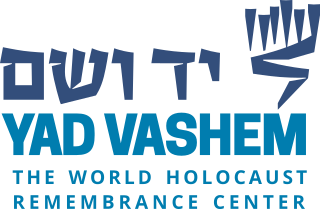
Yad Vashem is Israel's official memorial to the victims of the Holocaust. It is dedicated to preserving the memory of the Jews who were murdered; echoing the stories of the survivors; honoring Jews who fought against their Nazi oppressors and gentiles who selflessly aided Jews in need; and researching the phenomenon of the Holocaust in particular and genocide in general, with the aim of avoiding such events in the future. Yad Vashem's vision, as stated on its website, is: "To lead the documentation, research, education and commemoration of the Holocaust, and to convey the chronicles of this singular Jewish and human event to every person in Israel, to the Jewish people, and to every significant and relevant audience worldwide."

Bruno Schulz was a Polish Jewish writer, fine artist, literary critic and art teacher. He is regarded as one of the great Polish-language prose stylists of the 20th century. In 1938, he was awarded the Polish Academy of Literature's prestigious Golden Laurel award. Several of Schulz's works were lost in the Holocaust, including short stories from the early 1940s and his final, unfinished novel The Messiah. Schulz was shot and killed by a Gestapo officer in 1942 while walking back home toward Drohobycz Ghetto with a loaf of bread.

The Black Book of Soviet Jewry or simply The Black Book, also known as The Complete Black Book of Russian Jewry, is a 500-page document compiled for publication by Ilya Ehrenburg and Vasily Grossman originally in late 1944 in the Russian language. It was a result of the collaborative effort by the Jewish Anti-Fascist Committee (JAC) and members of the American Jewish community to document the anti-Jewish crimes of the Holocaust and the participation of Jews in the resistance movement against the Nazis during World War II. The 1991 Kyiv edition of The Black Book was subtitled The Ruthless Murder of Jews by German-Fascist Invaders Throughout the Temporarily-Occupied Regions of the Soviet Union and in the German Nazi Death Camps established on occupied Polish soil during the War 1941–1945.

Righteous Among the Nations is a title used by Yad Vashem to describe people who, for various reasons, made an effort to assist victims, including Jews, who were being exterminated by Nazi Germany during the Holocaust. The term originates from the concept of ger toshav, a legal term used to refer to non-Jewish observers of the Seven Laws of Noah.
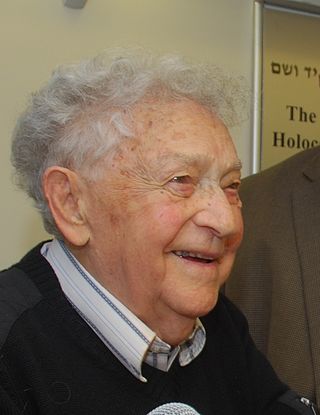
Yitzhak Arad was an Israeli historian, author, IDF brigadier general and Soviet partisan. He also served as Yad Vashem's director from 1972 to 1993, and specialised in the history of the Holocaust.
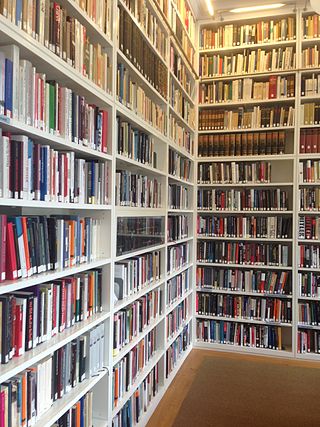
The Wiener Holocaust Library is the world's oldest institution devoted to the study of the Holocaust, its causes and legacies. Founded in 1933 as an information bureau that informed Jewish communities and governments worldwide about the persecution of the Jews under the Nazis, it was transformed into a research institute and public access library after the end of World War II and is situated in Russell Square, London.
Holocaust survivors are people who survived the Holocaust, defined as the persecution and attempted annihilation of the Jews by Nazi Germany and its allies before and during World War II in Europe and North Africa. There is no universally accepted definition of the term, and it has been applied variously to Jews who survived the war in German-occupied Europe or other Axis territories, as well as to those who fled to Allied and neutral countries before or during the war. In some cases, non-Jews who also experienced collective persecution under the Nazi regime are considered Holocaust survivors as well. The definition has evolved over time.

Tadeusz Pankiewicz, was a Polish Roman Catholic pharmacist, operating in the Kraków Ghetto during the Nazi German occupation of Poland. He was recognized as "Righteous Among the Nations" by Yad Vashem on February 10, 1983, for rescuing countless Jews from the Holocaust.

David H. Kranzler was an American professor of library science at Queensborough Community College, New York, who specialized in the study of the rescue of Jews during the Holocaust.

Rut "Rutka" Laskier was a Jewish Polish diarist who is best known for her 1943 diary chronicling the three months of her life during the Holocaust in Poland. She was murdered at Auschwitz concentration camp in 1943 at the age of fourteen. Her manuscript, authenticated by Holocaust scholars and survivors, was published in the Polish language in early 2006. English and Hebrew translations were released the following year. It has been compared to the diary of Anne Frank.

Dina Porat is an Israeli historian. She is professor emeritus of modern Jewish history at the Department of Jewish History at Tel Aviv University and the chief historian of Yad Vashem.
Livia Rothkirchen was a Czechoslovak-born Israeli historian and archivist. She was the author of several books about the Holocaust, including The Destruction of Slovak Jewry (1961), the first authoritative description of the deportation and murder of the Jews of Slovakia.
The Yad Vashem International Book Prize for Holocaust Research is an annual award by Yad Vashem in recognition of high scholarly research and writing on the Holocaust or its antecedents and aftermath published two years preceding the year of the award. It was established in 2011 in memory of Abraham Meir Schwartzbaum, Holocaust survivor, and his family who was murdered in the Holocaust.
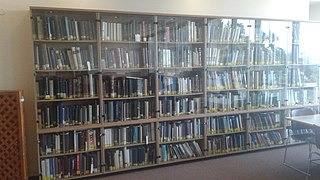
Yizkor books are memorial books commemorating a Jewish community destroyed during the Holocaust. The books are published by former residents or landsmanshaft societies as remembrances of homes, people and ways of life lost during World War II. Yizkor books usually focus on a town but may include sections on neighboring smaller communities.

Rokhl Auerbakh was an Israeli writer, essayist, historian, Holocaust scholar, and Holocaust survivor. She wrote prolifically in both Polish and Yiddish, focusing on prewar Jewish cultural life and postwar Holocaust documentation and witness testimonies. She was one of the three surviving members of the covert Oyneg Shabes group led by Emanuel Ringelblum that chronicled daily life in the Warsaw Ghetto, and she initiated the excavation of the group's buried manuscripts after the war. In Israel, she directed the Department for the Collection of Witness Testimony at Yad Vashem from 1954 to 1968.
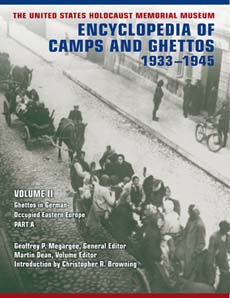
Encyclopedia of Camps and Ghettos, 1933–1945 is a seven-part encyclopedia series that explores the history of the concentration camps, ghettos, forced-labor camps, and other sites of detention, persecution, or state-sponsored murder run by Nazi Germany and other Axis powers in Europe and Africa. The series is produced by the United States Holocaust Memorial Museum (USHMM) and published by Indiana University Press. Research began in 2000; the first volume was published in 2009; and the final volume is slated for publication in 2025. Along with entries on individual sites, the encyclopedias also contain scholarly overviews for historical context.

Jan Zbigniew Grabowski is a Polish-Canadian professor of history at the University of Ottawa, specializing in Jewish–Polish relations in German-occupied Poland during World War II and the Holocaust in Poland.

Roni Stauber is an Israeli historian. He is an Associate Professor in the Department of Jewish History at Tel Aviv University. Stauber serves as the Director of the Goldstein-Goren Diaspora Research Center and the Director of the university's Diploma Program in Archival and Information Science. Stauber is also a member of the academic committee of Yad Vashem. His research focuses on various aspects of Holocaust memory and the formation of Holocaust consciousness in Israel and around the world. In particular, he examines the interrelations between ideology and politics, and between collective memory and historiography, with a focus on Israeli-German relations.















